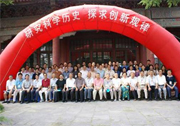| 中文题目: | 在国内培育新知——“友谊树”阿尔巴尼亚油橄榄在中国 | ||||||
| 英文题目: | Breeding New Knowledge at Home: The Case of the Albanian Olive Friendship Tree in China | ||||||
| 作 者: | 舒喜乐 | ||||||
| 刊物名称: | Chinese Annals of History of Science and Technology | ||||||
| 发表年度: | 2019 | ||||||
| 卷: | 3 | ||||||
| 期: | 2 | ||||||
| 页码: | 195–214 | ||||||
| 中文摘要: | 本文以“中阿友谊树”为例,考察了20世纪六七十年代在中国发生的跨国科学交流的意义与局限。1964年,阿尔巴尼亚向中国赠送了一万棵橄榄树,作为中阿两国人民永恒友谊的象征。这些橄榄树交由中国的农业科学家和农民来寻找合适的方式进行繁殖和栽培。作者发现,虽然橄榄树被用作国际友谊和科学交流的象征,但与其说产生和流传于中国的、与橄榄树相关的知识是“被传输的知识”(即跨国流动的知识),毋宁说它们是“背景中的科学”(即20世纪六七十年代中国国内政治背景下的科学)。从阿尔巴尼亚入境的橄榄树,最终成为中国本土农业知识和“文化大革命”时期知识生产和流通系统的又一个应用实例。
|
||||||
| 英文摘要: | This article uses the case of the Sino-Albanian Friendship Trees to examine the significance and the limits of transnational scientific exchange in China during the 1960s and 1970s. In 1964, Albania gave ten thousand olive trees to China as a symbol of the eternal friendship of the Chinese and Albanian people; it was then up to Chinese agricultural scientists and farmers to find suitable means to propagate and cultivate them. The author finds that, though the olive trees served as symbols of international friendship and scientific exchange, knowledge about olive trees produced and circulated in the PRC reflected science in context (that is, science within the national-level political context of 1960s–1970s China) more than knowledge in transit (that is, the transnational circulation of knowledge). The importation of olive trees from Albania ended up offering a new application for Chinese agricultural knowledge and for quintessentially “Cultural Revolution”-era systems of knowledge production and circulation.
|
||||||








